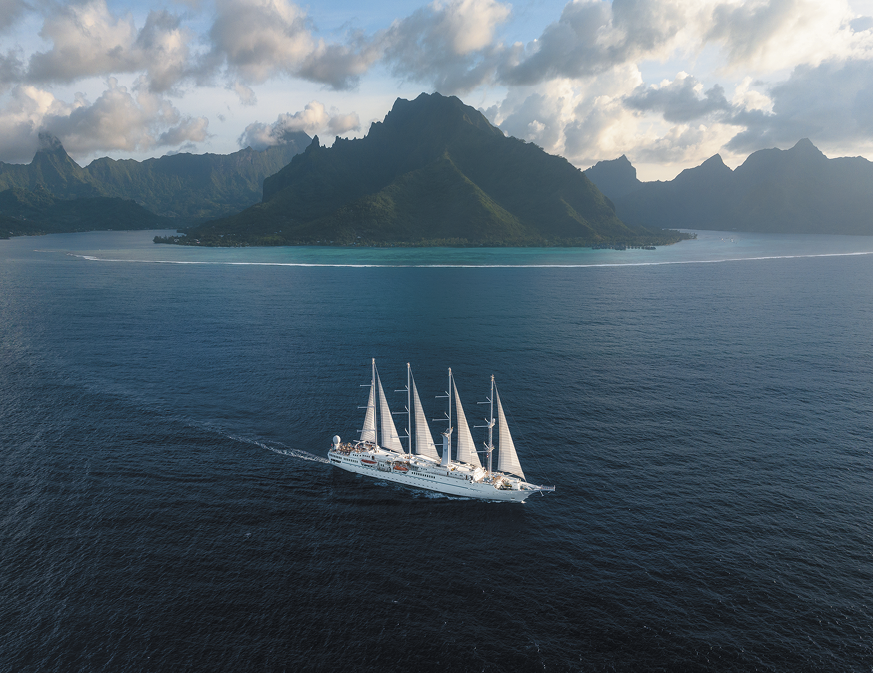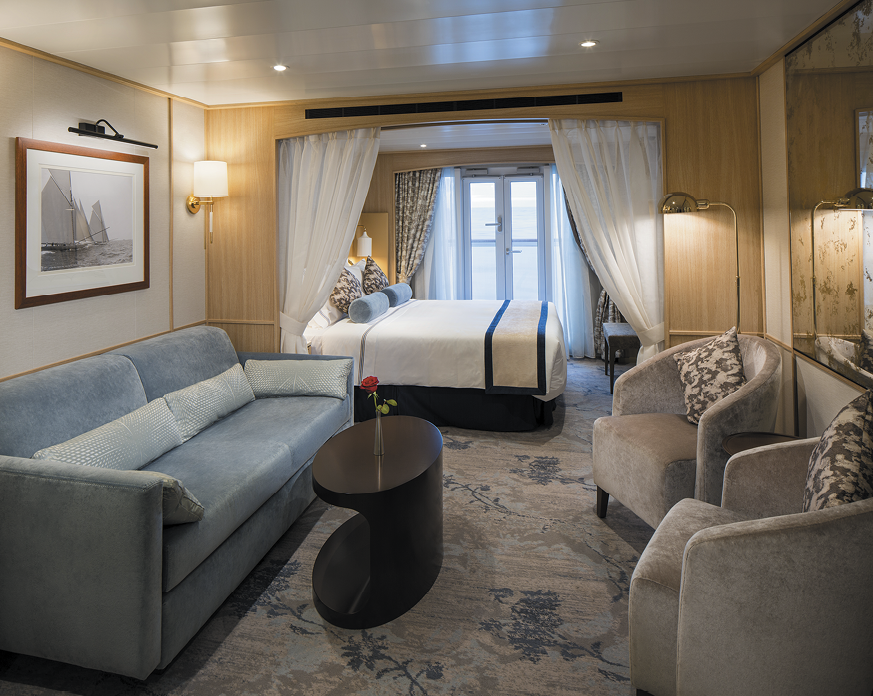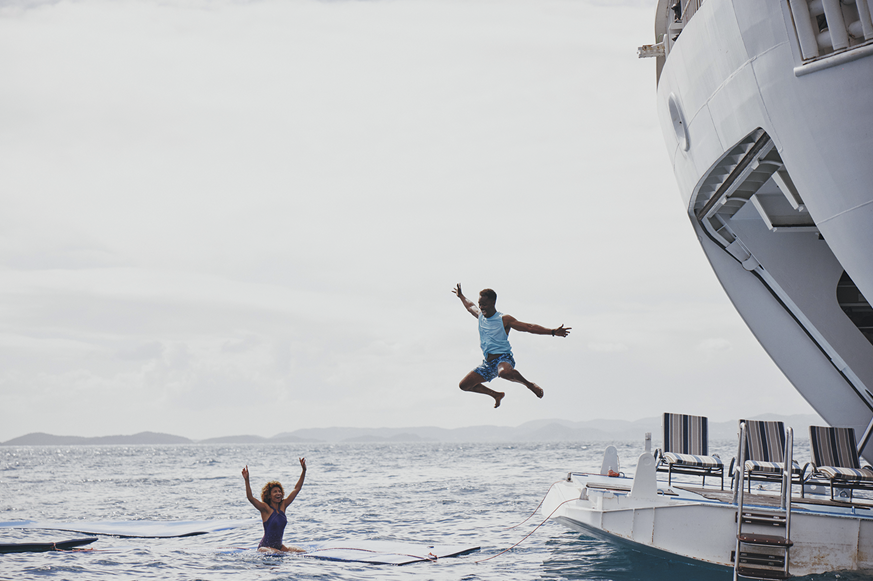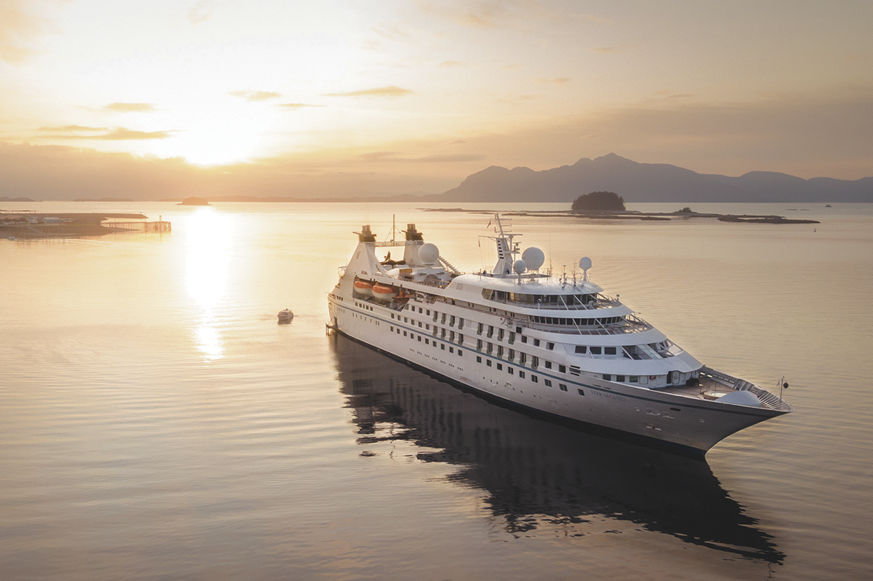- Home
- Media Kit
- MediaJet
- Current Issue
- Past Issues
- Ad Specs-Submission
- Reprints (PDF)
- Photo Specifications (PDF)
- Contact Us
- PRIVACY POLICY
- TERMS OF USE
![]()
ONLINE
![]()
ONLINE

180 Degrees From Ordinary
Editors’ Note
Chris Prelog has firsthand knowledge that working aboard cruise ships is hard work. As a young 20-something, he called his dad to tell him he wasn’t cut out for his cruise line job as a waiter, but his dad told him he needed to follow it through. He did, and eventually he got in the groove and loved working as part of a crew. That he’s now president of the cruise line that owns that first ship he worked aboard is no surprise. With more than 20 years in the industry, he knows the ins and outs of how a cruise line works. Originally from Austria, Prelog earned a bachelor’s degree from the Higher Tourism Institute in Austria along with several tourism and accounting certificates from U.S. colleges. He joined Windstar in 2017 and loves the supportive family-like atmosphere. He’s a member of the Culinary Institute of America’s invitation-only Society of Fellows.
Company Brief
Windstar Cruises operates a fleet of six boutique all-suite and sailing yachts carrying 148-342 guests. Small ship cruises sail throughout Europe, the Caribbean, Costa Rica and the Panama Canal, Asia, New England and Eastern Canada, the Middle East, and the South Pacific, including a ship year-round in Tahiti. Windstar (windstarcruises.com) launched the $250 Million Star Plus Initiative to transform the three all-suite Star Plus Class yachts with new suites, restaurants, and a world-class spa and fitness center. The award-winning line is known for immersive experiences, destination authenticity, port-intensive itineraries, exceptional service, and an innovative culinary program.

Windstar operates a fleet of six ships: three with
motorized sails and three all-suite power yachts
Did you know at an early age that you had a passion for the cruise industry and what has made the industry so special for you?
I grew up in the service industry. My dad owned a number of businesses. He ran grocery stores, ice cream shops, food and beverage stands at trade shows. So, I’ve grown up in service-oriented surroundings, and Austria is well respected around the world for their hospitality and the hospitality business, as well as their hospitality education. My dad and my mother encouraged me to go to the Tourism Institute in Bad Gleichenberg. It’s a well-known, established hospitality management school in Austria, and many senior executives have visited that school or been educated there. I learned everything about hospitality in the program, not just service and cooking, but the whole administrative part and financial side, the marketing and sales side – everything you need to know about the business of hospitality, which is what the cruise industry is really about.
I worked in hotels for a while, but felt like I wanted to do something else. Friends from school had talked about cruising and how it was an exciting industry if you wanted to see the world. I found that intriguing. When I boarded my first ship, my world turned upside down. I could feel the ship moving while it was moored to the pier. My knees got wobbly and being on a boat just didn’t seem right. It can happen when you join the cruise industry; you don’t know what you’ve signed up for. You get thrown into everything so quickly. It’s very busy and you need to learn many disciplines. On top of that, the ship moves. I got seasick and didn’t feel that great. Then, I was demoted from head waiter to waiter. The system aboard a ship compared to regular restaurant operations is very different, and my English wasn’t that good. There was also a bit of a cultural gap – we don’t eat English muffins in Austria and I’d never seen one before. So here I was polishing cutlery and learning the “cruise industry trade” from the very baseline, and now I am hugely grateful that I was able to get this experience.
You need a little time to get used to cruising, but you’re joining a family and you develop friendships. It took a little while to establish myself, but eventually I made headway and became head waiter and maître d’hotel, some of the most difficult jobs on the ship. I think that’s what drew me to cruising as well, because you work with people who have different nationalities, ethnic backgrounds, religions, and so forth, and everyone works in harmony on the ship. That’s a pretty cool thing, and then if you want to see the world and learn about other cultures, you do.
I was about to become hotel manager when life threw me a curveball. My daughter was born in Austria. It’s hard when you have a baby and have to leave for four months. I didn’t want to leave my family at home, but I didn’t want to leave my family at sea, either. I returned to the ship and the senior management of Seabourn surprised me and asked if I wanted to move to the head office in Miami. Four months later my family and I arrived in Miami, which was a turning point. It was then I decided that cruising and I were going to get serious. I was going to expand my horizon and learn, learn, learn.

A Windstar balcony room
You are very focused as a leader on company culture. How do you describe Windstar Cruises’ culture and how critical is maintaining culture to the success of the company?
One thing that really stands out about Windstar is that our leadership learned the ropes and rose through the ranks – literally. I started out as a waiter on a small cruise ship (now Windstar’s Star Legend), and other top Windstar executives also worked as servers, band leaders, and even captains on ships – many began on the bottom of the ladder and earned their way to the top. That experience is rare in today’s corporate world and brings with it knowledge and know-how, plus a deep appreciation for service and attention to detail that can’t be taught in school – or on land.
We also have a culture that’s devoted to gender equality, which extends to our onboard leadership as well, where we’re proud to have an array of female leaders. One remarkable example is Captain Belinda Bennett, who holds the distinction of being the world’s first Black female cruise ship captain. Her presence on board our ships is not only inspiring, but also symbolic of the broader shifts happening in the industry.
And of course, our crew and our service are what make Windstar such a different cruise line. With one of the highest crew-to-passenger ratios in the industry, Windstar ships provide a level of personalized service few competitors do. We also have an incredibly high return rate of our crew members (above 90 percent), which translates to success across a variety of platforms from sheer productivity and mastery of tasks to sustained and meaningful interactions with repeat guests over the years.
Our crew is warm, inviting, and comfortable – without ever being stuffy. They know your drink preferences and how you take your morning coffee, but you also get to dance with them at the deck barbecue or see them perform in the crew talent show – you get to know them as individuals. You see them enjoying the ports on their down time. That is a wildly different culture and setup than most cruise lines where you may not ever even see your cabin steward, much less know their name. Our crew and guests have formed lasting bonds, and that’s something you can’t just manufacture. You build that culture over time.

All Windstar ships have a unique Watersports Platform,
allowing the ocean to be guests’ infinity pool
What have been the keys to Windstar Cruises’ industry leadership and how do you define the Windstar difference?
Windstar Cruises is truly unique in that it is a small ship line that’s casually elegant and 180 degrees from ordinary. We provide relaxation at its best, and we’re known for our immersive excursions, port-intensive itineraries (often with late nights and overnights), exceptional award-winning service, and innovative culinary programs.
Our guests leave the crowds behind on small, elegant ships which accommodate between 148 to 342 guests, feeling more like a private yacht than a commercial cruise ship. This intimacy provides guests with the luxuries of time, space, and freedom to immerse themselves in the destination.
Our Watersports Platform lets you swim off the back of the yacht directly into the ocean and enjoy activities such as stand-up paddle boarding right off the ship. I like to say that the ocean is our infinity pool on Windstar. We also maintain an “Open Bridge” policy which allows guests to visit the Bridge to see where the captain charts their course. Guests can learn about the navigation equipment and catch a behind-the-scenes look into the ship over a cup of coffee or tea. It’s that kind of intimacy and access that makes such a difference.
Will you provide an overview of Windstar Cruises’ ships and how Windstar is continuing to redesign and renovate its fleet?
Windstar Cruises operates a six-ship fleet. Three are iconic sailing yachts, which we call the Wind Class, and three are all-suite luxury yachts, our Star Plus Class. All explore the hidden harbors and secluded coves of the world’s most treasured destinations.
We recently undertook a $250 million project to stretch and renovate the Star Plus Class yachts, and now we’re embarking on a multi-million-dollar initiative to redesign and update the Wind Class ships. The project encompasses a full redesign of all public spaces with new layouts, furniture, wall and floor coverings, lighting, and custom art. The Owner’s Suites are being redesigned including new furniture and all staterooms will receive new décor and interactive televisions. Look for a new pool and hot tub, expanded bar areas, as well as a redesigned spa and gym with state-of-the-art equipment. Our guests are going to love it.

One of three Windstar all-suite power yachts
How has Windstar Cruises approached its restaurant/food and beverage offerings?
On Windstar there is no wait list to dine, no multiple seatings to force into your schedule, no upsell for specialty restaurants, plus, complimentary 24-hour room service. Local seafood, aged spirits, fresh produce and seafood purchased from local markets by Windstar chefs (often with guests in tow), and even homemade family recipes from the crew are all on the menu as we cater to all palates and culinary interests.
Windstar is the Official Cruise Line of the James Beard Foundation, and next year we’ll be celebrating ten years of partnership. It’s all part of an ongoing commitment to unique epicurean experiences at sea, and Windstar recently announced the addition of curated wines to some of the line’s most unique itineraries in 2024. Award-winning, small-lot wines will be featured on five Windstar sail dates this year, several coinciding with Windstar’s existing James Beard Foundation themed culinary cruises. On each sailing guests will have the opportunity to partake in wine tasting events tailored to discovering wines that are available exclusively at the winery and to wine club members.
So much of what we offer is prepared a la minute (cooked to order), so that certainly sets us apart from many of the larger cruise lines who simply can’t do that based on capacity. We’re also really adept at dealing with dietary issues and restrictions – we’re able to speak with the guest in advance and make a plan.
Windstar also recently created a new vegan menu for all six of the line’s yachts in partnership with the National Health Association. The offerings are not only plant-based, but also prepared without added salt, oil, sugar, and flour. A full themed cruise serving only plant-based meals both on board and during shore excursions was recently added in Tahiti for 2025. The cruise is already sold out, and additional plant-based themed cruises are being planned.
To sum it up, we know people have a wide range of preferences in what they eat. We take a highly customized approach to dining, but our overall mantra is to make it local whenever possible, make it delicious, and make it special.
What are the traits you look for when hiring talent at Windstar?
We are looking for people with an uplifting outlook on life – specifically positive energy traits, and a commitment not just to a company but the industry as a whole. People who have the grit, endurance, and commitment to travel and cruise for a living. I always look for fun in a person – the world is serious enough. Having the ability to “let your hair down” is important too.
What are your views on the future of cruising and how is Windstar positioned to adapt and evolve to meet the future needs of its guests?
Cruising is a hospitality and service industry, and my background in hospitality helps to position Windstar as the leader in small-yacht cruising. I like to always look through two lenses when touching the brand: the lens of our guests – what they will experience – and the lens of our crew on how to deliver it. I think I am very fortunate that I have had both experiences, which helps tremendously working onboard to understand how that gets delivered. It’s also important that we do a good job of telling the story of how cruising is a highly adaptable industry and a fantastic vacation option. We have adapted to a number of crises and each time have come out of it stronger.
What do you see as the keys to effective leadership and how do you describe your management style?
My management style centers around collaboration, communication, and coordination, but at the heart of everything is strong involvement of the frontline team members as we adapt to change together. I am keenly focused on our teams both ashore and onboard. Without their great work we would not be where we are today. My mantra is that I will always make time for my employees and enter each interaction as an opportunity to learn and change.
What advice do you offer to young people interested in a career in the cruise industry?
The cruise industry allows you to see the world, join the family-like hospitality industry, and make great friends from every walk of life. It’s an incredible business comprised of a very diverse group of passionate people. The cruise industry will broaden your horizons, and you will learn so much; however, if you aren’t open to change, it may not be for you. The cruise industry is a highly adaptable industry and environment, and if you’re open to new ways of doing things and seeing change as an opportunity, well, welcome aboard.![]()